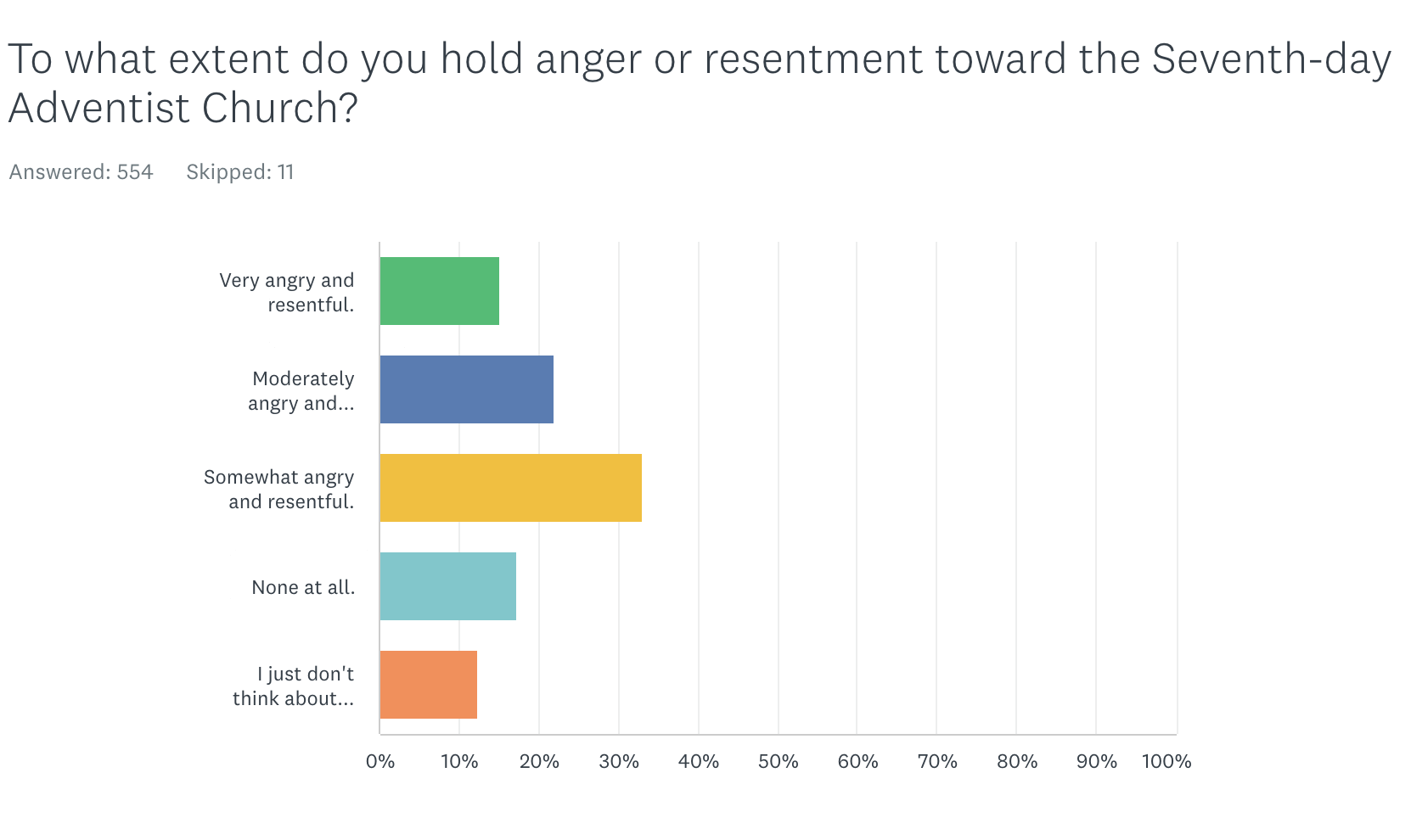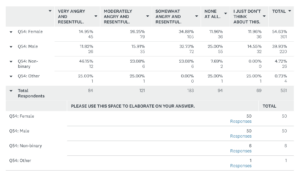There is anger and resentment
Question 28 reads, “To what extent do you hold anger or resentment toward the Seventh-day Adventist Church?” The response options are “Very,” “Moderately,” “Somewhat,” Not at all,” and “I just don’t think about this.”
One of the reasons for including this question in the survey was to test what I recall (and still do perceive) as a general sentiment among still-Adventists that ex-Adventists are angry. Angry at God, angry at The Church, angry in general.

And, well, the data so far indicate that the still-Adventists might be right. The two highest rates of response are for “Somewhat angry and resentful” (33.9%), and “Moderately angry and resentful” (21.76%). If we include the 15.17% of respondents who selected “Very angry…”, 70% of respondents to the survey so far say they harbored some anger or resentment toward the SDA structure at the time they took the survey.

Females are more angry
When we overlay responses to Q28 by gender (Q54) it seems that females are angrier than male respondents. Having grown up Adventist, I feel like this makes sense. Adventism is essentially a patriarchal system, and quite a number of (presumably) female respondents commented that they were angry at Adventist “purity culture” or “the way women are treated” inside the system. The analysis gets more complicated when we also overlay those who report being “non-binary” to Q54. In any case, a whopping 76% of females reported being angry to some extent, compared to males at 61%. All these data cry out for deeper analysis and exploration, and that will come in future posts.

These are interesting sets of numbers. There is much to ponder and make about the fact that of our sample of ex-Adventists so far, around 70% are angry and/or resentful at the Adventist system. However, the really interesting part (at least for me) comes in the comments. Many respondents have commented to the effect that they were once angry, but no longer are:
“I’m less angry these days, however it comes in waves. I mostly feel sad for the wasted years and the people who still remain.”
“It’s been years and I’m a rational person. I’ve moved past most of my direct anger.”
“A LOT less angry than I used to be.”
However, the most commonly expressed emotion in the comments was sadness, sometimes as grief or mourning:
“I don’t think I feel angry but more sadness for them and the burden they are placed under.”
“I had to let go of anger, resentment but mostly heartbreak over the loss of involvement in an institution that had really been my whole life.”
“I don’t consider myself angry. I am very sad.”
“I have a lot of grief.”
Anger shifts to sadness
It feels telling that even in the context of 70% of respondents reporting anger, many of the comments equivocate on anger and shift to sadness. My memories of adolescence and young adulthood inside the Adventist system are that emotions were generally muted. There was a lot of talk of being “happy,” and happiness and joy were tolerated up to a point, so long as those expressions were not too extreme. Sadness, grief, disappointment were similarly acceptable emotions, provided the expressions of those emotions were not too dramatic.
“I mourn the wasted years of complete indoctrination. Negative emotions are destructive so I try to focus on the intellectual and spiritual freedom of the present.”
The white, North American Adventism that I grew up in seemed endlessly focused on the appearance of “happiness.” Catchy sayings, a lot of verbal affirmation for people who always acted “happy,” innumerable songs about being cheerful were all de rigueur. But anger always seemed like an off-limits emotion. Angry people got shut down, shushed, eventually excluded, “cancelled,” in today’s parlance.
It took me years to be able to name the anger in my own emotional repertoire. To this day I instinctively want to downplay, or hide anger in almost any setting. Perhaps, like so many aspects of being Adventist, anger is one of those things that some of us who have left the movement take some time to make peace with. Like bacon or alcohol* or jewelry, disallowed emotions are acquired tastes.
“I have a hard time with anger partly because of how I was raised- anger feels unsafe now & so many feelings were repressed. I’m still working on that now.”
What do you think? Let us know in the comments. Email us: exsda@proton.me, arcaro@elon.edu
=======
*Specifically bacon and alcohol come up constantly in the comments to many of the questions in the ex-Adventist survey.


 Follow
Follow
“However, the really interesting part (at least for me) comes in the comments. Many respondents have commented to the effect that they were once angry, but no longer are”
“It feels telling that even in the context of 70% of respondents reporting anger, many of the comments equivocate on anger and shift to sadness.”
This tracks for me and would explain why Adventists would misperceive Ex-Adventists as being angry. If contact and anger diminish over time, they wouldn’t have visibility into this trend.
Easy enough to get quantitative data though! It’s in the survey already.
2. How old were you when you realized you no longer believed the doctrines and teachings of the Seventh-day Adventist Church?
59. To which generation do you belong? [date of birth cohort]
How old were they when they left?
28. To what extent do you hold anger or resentment toward the Seventh-day Adventist Church?
How angry are they now?
Does anger generally reduce with time?
I don’t know that I ever totally enjoyed beings an SDA, but that is the way I was raised and I fully believed that if I didn’t obey all of the rules I would probably burn in the lake of fire. After completing my Adventist education, elementary through college, I married an Adventist man whom I met in college. He became a teacher in an Adventist academy. One time he took a ring away from one of his female students. He didn’t know what to do with it so he left it on our dresser. While he was away at school I enjoyed wearing it around the house. I’m pretty sure he wouldn’t have cared if I had admitted to him what I had done. He was intelligent, studied things out and became convinced that many of the things his church taught just weren’t so. Eventually he had his name removed from the “books.” I didn’t talk to him about his reasons because I was convinced he was wrong. Now that he is deceased I so wish I had asked him lots of questions and listened carefully to his responses.
About 2 years ago, I requested to have my name removed from the “books.” It’s taken a long time. (I am now 83 years old.) But I think I made the right decision.